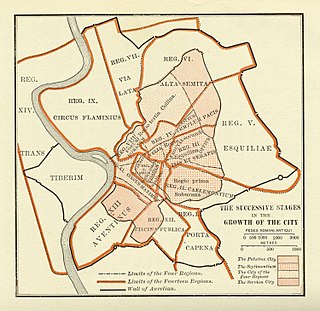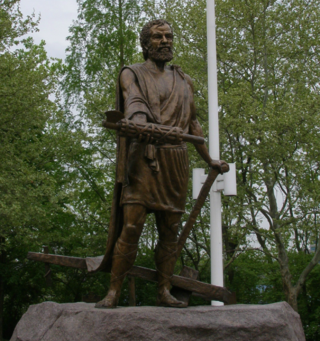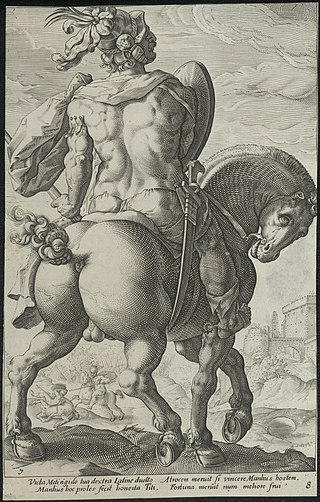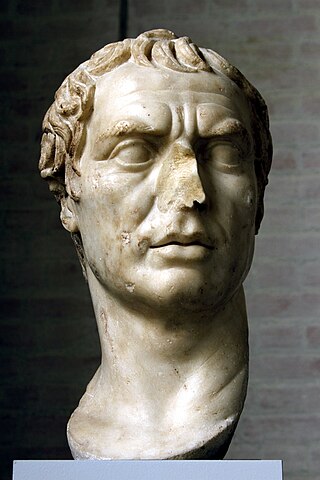Related Research Articles

The Roman Kingdom,also referred to as the Roman monarchy or the regal period of ancient Rome,was the earliest period of Roman history when the city and its territory were ruled by kings. According to tradition,the Roman Kingdom began with the city's founding c. 753 BC,with settlements around the Palatine Hill along the river Tiber in central Italy,and ended with the overthrow of the kings and the establishment of the Republic c. 509 BC.

Tribune was the title of various elected officials in ancient Rome. The two most important were the tribunes of the plebs and the military tribunes. For most of Roman history,a college of ten tribunes of the plebs acted as a check on the authority of the senate and the annual magistrates,holding the power of ius intercessionis to intervene on behalf of the plebeians,and veto unfavourable legislation. There were also military tribunes,who commanded portions of the Roman army,subordinate to higher magistrates,such as the consuls and praetors,promagistrates,and their legates. Various officers within the Roman army were also known as tribunes. The title was also used for several other positions and classes in the course of Roman history.

Praetor,also pretor,was the title granted by the government of ancient Rome to a man acting in one of two official capacities:(i) the commander of an army,and (ii) as an elected magistratus (magistrate),assigned to discharge various duties. The functions of the magistracy,the praetura (praetorship),are described by the adjective itself:the praetoria potestas,the praetorium imperium,and the praetorium ius,the legal precedents established by the praetores (praetors). Praetorium,as a substantive,denoted the location from which the praetor exercised his authority,either the headquarters of his castra,the courthouse (tribunal) of his judiciary,or the city hall of his provincial governorship. The minimum age for holding the praetorship was 39 during the Roman Republic,but it was later changed to 30 in the early Empire.

Lucius Quinctius Cincinnatus was a Roman patrician,statesman,and military leader of the early Roman Republic who became a legendary figure of Roman virtue—particularly civic virtue—by the time of the late Republic.

The decemviri or decemvirs refer to official 10-man commissions established by the Roman Republic.
The equites constituted the second of the property-based classes of ancient Rome,ranking below the senatorial class. A member of the equestrian order was known as an eques.

The Conflict of the Orders,also Struggle of the Orders,was a political struggle between the plebeians (commoners) and patricians (aristocrats) of the ancient Roman Republic lasting from 500 BC to 287 BC in which the plebeians sought political equality with the patricians. It played a major role in the development of the Constitution of the Roman Republic. Shortly after the founding of the Republic,this conflict led to a secession from Rome by the Plebeians to the Sacred Mount at a time of war. The result of this first secession was the creation of the office of plebeian tribune,and with it the first acquisition of real power by the plebeians.

The magister equitum,in English Master of the Horse or Master of the Cavalry,was a Roman magistrate appointed as lieutenant to a dictator. His nominal function was to serve as commander of the Roman cavalry in time of war,but just as a dictator could be nominated to respond to other crises,so the magister equitum could operate independently of the cavalry;like the dictator,the appointment of a magister equitum served both military and political purposes.
Tribune of the plebs,tribune of the people or plebeian tribune was the first office of the Roman state that was open to the plebeians,and was,throughout the history of the Republic,the most important check on the power of the Roman Senate and magistrates. These tribunes had the power to convene and preside over the Concilium Plebis;to summon the senate;to propose legislation;and to intervene on behalf of plebeians in legal matters;but the most significant power was to veto the actions of the consuls and other magistrates,thus protecting the interests of the plebeians as a class. The tribunes of the plebs were typically found seated on special benches set up for them in the Roman Forum. The tribunes were sacrosanct,meaning that any assault on their person was punishable by death. In imperial times,the powers of the tribunate were granted to the emperor as a matter of course,and the office itself lost its independence and most of its functions.
The Licino-Sextian rogations were a series of laws proposed by tribunes of the plebs,Gaius Licinius Stolo and Lucius Sextius Lateranus,enacted around 367 BC. Livy calls them rogatio –though he does refer to them at times as lex –as the plebeian assembly did not at the time have the power to enact leges (laws).

A consular tribune was putatively a type of magistrate in the early Roman Republic. According to Roman tradition,colleges of consular tribunes held office throughout the fifth and fourth centuries BC during the so-called "Conflict of the Orders". The ancient historian Livy offered two explanations:the Roman state could have needed more magistrates to support its military endeavours;alternatively,the consular tribunate was offered in lieu of the ordinary consulship to plebeians so to maintain a patrician lock on the consulship.
Secessio plebis was an informal exercise of power by Rome's plebeian citizens between the 5th century BC and 3rd century BC.,similar in concept to the general strike. During the secessio plebis,the plebs would abandon the city en masse in a protest emigration and leave the patrician order to themselves. Therefore,a secessio meant that all shops and workshops would shut down and commercial transactions would largely cease. This was an effective strategy in the Conflict of the Orders due to strength in numbers;plebeian citizens made up the vast majority of Rome's populace and produced most of its food and resources,while a patrician citizen was a member of the minority upper class,the equivalent of the landed gentry of later times. Authors report different numbers for how many secessions there were. M. Cary and H. H. Scullard state there were five between 494 BC and 287 BC.

A tribus,or tribe,was a division of the Roman people for military,censorial,and voting purposes. When constituted in the comitia tributa,the tribes were the voting units of a legislative assembly of the Roman Republic.

Titus Manlius Imperiosus Torquatus was a famous politician and general of the Roman Republic,of the old gens Manlia. He had an outstanding career,being consul three times,in 347,344,and 340 BC,and dictator three times,in 353,349,and 320 BC. He was one of the early heroes of the Republic,alongside Cincinnatus,Cornelius Cossus,Furius Camillus,and Valerius Corvus. As a young military tribune,he defeated a huge Gaul in one of the most famous duels of the Republic,which earned him the epithet Torquatus after the torc he took from the Gaul's body. He was also known for his moral virtues,and his severity became famous after he had his own son executed for disobeying orders in a battle. His life was seen as a model for his descendants,who tried to emulate his heroic deeds,even centuries after his death.
Marcus Junius D. f. D. n. Silanus was a member of the Junii Silani,a noble Roman family,who held the consulship in 109 BC.

Publius Cornelius Scipio Africanus was a Roman general and statesman,most notable as one of the main architects of Rome's victory against Carthage in the Second Punic War. Often regarded as one of the greatest military commanders and strategists of all time,his greatest military achievement was the defeat of Hannibal at the Battle of Zama in 202 BC. This victory in Africa earned him the honorific epithet Africanus,literally meaning "the African",but meant to be understood as a conqueror of Africa.
Servius Sulpicius Camerinus Cornutus was a Roman politician in the 5th century BC,consul in 461 BC and decemvir in 451 BC.
Lucius Furius Medullinus was a Roman politician active during the 5th century BC,and was consular tribune in 432,425,and 420 BC.
Lucius Sergius Fidenas was a Roman politician during the 5th century BC,and was elected consul in 437 and 429 BC. In 433,424,and 418 BC he was military tribune with consular power.
Publius Cornelius Rutilus Cossus was a statesman and military commander from the early Roman Republic who served as Dictator in 408 BC.
References
- ↑ Robert Maxwell Ogilvie, Commentary on Livy, books 1–5, Oxford, Clarendon Press, 1965, pp. 404, 405.
- ↑ Livy, Ab urbe condita , 4.7